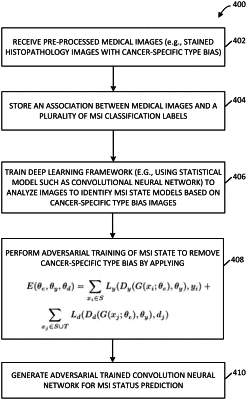| CPC G06N 3/084 (2013.01) [G06N 5/02 (2013.01); G06N 20/10 (2019.01)] | 15 Claims |

|
1. A computing device configured to generate an image-based microsatellite instability (MSI) prediction model, the computing device comprising one or more processors configured to:
obtain, via one or more processors, a set of stained histopathology images from one or more image sources, the set of stained histopathology images having a first cancer type-specific bias or a first data source-specific bias;
store in an electronic database, using the one or more computing devices, an association between the histopathology slide images and the plurality of MSI classification labels;
apply, via one or more processors, a statistical model to analyze the set of stained histopathology images and generate an initial baseline MSI prediction model, the initial baseline MSI prediction model exhibiting cancer type-specific bias or data source-specific bias;
apply, via one or more processors, an adversarial training to the baseline MSI prediction model; and
generate, via one or more processors, an adversarial trained MSI prediction model configured to predict MSI status for subsequent stained histopathology images,
the adversarial trained MSI prediction model characterized by a reduction in cancer type-specific bias or data source-specific bias in comparison to the initial baseline MSI prediction status model, and
the adversarial trained MSI prediction model configured to predict an MSI status including at least two of: (i) Microsatellite-High (MSI-H); (ii) Microsatellite-Stable (MSS); or Microsatellite-Low (MSI-L).
|